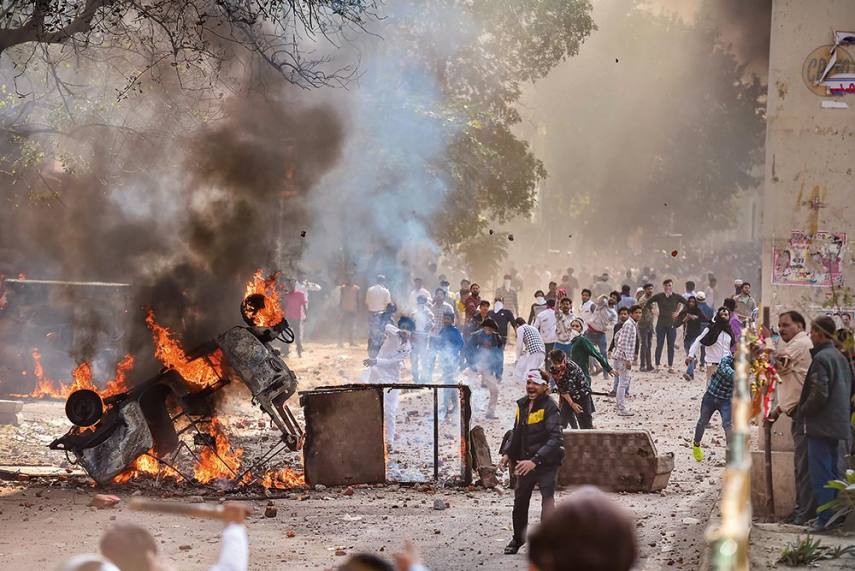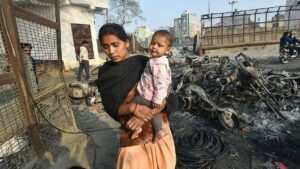Delhi Riots: Victims’ battle for justice & compensation continues

A total of 53 persons are reported to have been killed and over 600 injured in the Northeast Delhi riots 2020
“I will do what I did again. I don’t have any regrets, except that I couldn’t save the lives of Dinesh Khatik, Ankit Sharma (riot victims) and many others,” Kapil Mishra, a local leader of the Bharatiya Janata Party in northeast Delhi, said this during launch of a book Delhi Riots 2020: The Untold Story on February 23.
Mishra added that he did not regret the speech he delivered last year, a day before communal riots broke out in Northeast Delhi during the anti-Citizenship Amendment Act (CAA) protests. He went on to say that if required, he would do deliver a similar speech again. “Whenever roads will be blocked, and people would be prevented from going to work, there will always be a Kapil Mishra to stop that,” he said.
Far away from the event, Mishra’s words reverberated in the home and ears of Mohammad Shahabaj and his family. For Shahabaj, his family and thousands of others living in northeast Delhi, one of the poorest districts of the national capital which lacks nearly all basic amenities, Mishra’s words this year took them back exactly a year to February 23, 2020, when Mishra had issued an ultimatum to anti-CAA protesters who were camping at Delhi’s Jafrabad to end their agitation and threatened to ‘remove them’ from the protest site.
Soon enough, the same day, clashes began and unfolded into the worst riots to have hit Delhi for decades. Violence continued unabated for three days, with groups of armed men looting and burning shops, homes and religious spots and killing, at will. A total of 53 persons are reported to have been killed and over 600 injured in the riots that occurred even as the then US President Donald Trump was visiting Delhi.
Mishra’s threat to repeat what he did last year brought back memories of February 25, 2020 to the Shahabaj family. It was 7 am and Angoori Khatoon, a 37-year-old housewife, had just begun her day with prayers in the small house in Khajoori Khas in north eastern Delhi, where she had been living with her husband, Mohammad Shahabaj, a 40-year-old construction worker, and their five children.
Suddenly, her prayers were interrupted as a stone crashed through a window and landed in the house. Alarmed, Khatoon rushed to her husband and they peered cautiously out to see a group of over 100 persons, armed with firearms, petrol bombs, sticks, steel rods, swords and stones gathered outside their house and shouting violent slogans against Muslim and threatening the numerous Muslim families living in the area. Khatoon was worried about her two children who had gone to a madrasa in Fatima Masjid, opposite their house. She saw the mosque was already on fire. Luckily for them their children had already escaped from the mosque and were hiding.
Fearing that their house was the next target and worried that the mob would kill them, so Shahabaj took his wife and children and ran away leaving everything as it was and fled just to save their lives. They found shelter at a relative’s house away from the violence and hid there for days, still fearing for their life.
It was not until February 28, when a semblance of peace had been restored and police finally visible in the area that Shahabaj gathered enough courage to go and see his house. What he saw devastated him. The rioters had looted the entire house, carrying away valuables and cash that they found there, destroyed whatever they could take with them and then set fire to the house.
Fight for compensation
Since then, now for a year, Shahabaj, and dozens like him, have been seeking justice as well as compensation for the damage done to their homes and their lives. His first attempt to register an FIR (First Information Report) failed as the police refused to register a separate FIR and instead just attached his statement with hundreds or thousands of other complaints, even though the extent of damage and claims for compensation were vastly different for each case. Lawyers of the victims say that the police have ignored the basic guidelines issued by the Supreme Court which says that the police is obliged to register an FIR if a complainant discloses commission of a cognisable offence.

For a year now, victims have been seeking justice as well as compensation for damage done to their homes & lives
The reluctance of the police in filing of an FIR was only the first of the several hurdles that Shahabaj and other victims have had to face over the past year as they tried to rebuild their homes and lives after the riots. A bigger and continuing challenge for the victims has been to get compensation from the government for the damage. Even though Delhi chief minister Arvind Kejriwal had announced compensation for the victims of the riots, they say that not only have they not received the compensation, but even the amount being offered by the government is miniscule and does not cover even a fraction of the damage suffered by them.
Having done the run around between various government offices, a group of victims finally turned to the courts seeking justice and expedited payment of adequate compensation. In November last year, nine months after the riots, Shahabaj was forced to approach the Delhi High Court where he filed a writ against Delhi government seeking INR 5 million as compensation, of which INR 1 million to be paid as interim compensation. The compensation claim is based on the value of things looted and destroyed as well as the cost of repairing their home.
In the petition, Shahabaj says he and his family became the victims of the communal violence and lost everything due to the complete collapse of the rule of law. “The collapse is result of the inefficiency of the Delhi Police and government. Delhi Police failed to take control of the heinous mobs and at some place actively supported the members of the mob. Mobs comprising of hundreds of people were actively looking for Muslim houses, properties and means of livelihood to loot, burn and destroy. Our house also fell victim to this lawlessness, chaos and utter destruction. This unfortunate incident and after that the continuous denial of the compensation to us shows the hostile attitude of the system towards the victims of communal violence and massacres. Not only the system failed to protect their lives and properties during the communal violence but also after that, the authorities kept on dragging their feet and perpetuated helplessness and distress among the victims,” Shahabaj says in the petition.
Haider Ali, a lawyer with an NGO in New Delhi that is helping the riot victims, says that even after a year the attitude of the authorities as well as the people living in the areas has remained hostile against Muslims, who were a majority of the victims. “It is very unfortunate that even people who had been their neighbours for over 10 years still don’t treat the victims properly. They remain hostile, call them traitors and don’t trust them. It is very unfortunate, and the situation will become worse as there is no help from the state and even though the NGOs have been trying to harmonise the situation in the area but could not,” Ali tells Media India Group.
It is not just that the victims find themselves continuously being targetted by their neighbours and strangers equally, but also that they have not yet received compensation in order to restart their lives normally as the compensation promised by the government has proven not only to be elusive but also entirely inadequate. “Suppose a house there are 10 families staying in different rooms or apartments as tenants, as per the current compensation of INR 500,000 announced by the government, the landlord of the property would get INR 400,000 and the balance would be split between the 10 families, giving them only INR 10,000 each,” says Ali.
He goes on to say that the Delhi government denies any legal obligation to pay compensation and that it is only their moral obligation and hence the victims should take whatever is being given by the government and not ask for more. Indeed, this pretty much sums up the response filed by the Delhi government in this petition, which will come up for hearing on April 25.
Despite the hurdles encountered so far, Ali says he is hopeful of a reasonably early settlement of the cases. “When you see that the matters of compensation for victims of 1984 anti-Sikh riots are still continuing in the Supreme Court, I believe that our cases would be settled much faster than that, may be a couple of years at most as the State is bound to go into appeal should they lose the case,” Ali says.
While Shahabaj and other victims try to rebuild their lives and have mustered courage to at least fight for compensation, they continue to live in fear as the perpetrators of the violence as well as their leaders, including Kapil Mishra, union minister of state for finance Anurag Thakur and MP Parvesh Verma have gotten away scott free despite their very high pitched and incendiary speeches that actually called for violence, with slogans like ‘Desh ke gaddaron ko, goli maaro saalon ko,’ (Shoot the traitors dead).
Not a single case has been registered against any BJP leader over a year after the riots even though their speeches and provocative protest marches in the area were duly recorded and broadcast by dozens of television channels. Yet, last year, in response to a petition, Delhi Police filed an affidavit stating that it didn’t find any evidence against politicians such as Anurag Thakur, Kapil Mishra or Parvesh Verma and others to link them to riots.
Ali says that not only his clients but practically all the victims are scared to raise the issue or even name the people who damaged their homes or hurt them, despite the fact that some of them were their neighbours and the victims knew them.
“After the riots people were afraid to name any person in particular. There are many victims whose house was burnt by their neighbours and they have seen that. Still, they were afraid not to take their names. When I was writing their testimony, they gave me the names of the accused but when asked that should these names be included in the testimony they decided not to do so. They said, ‘don’t put their names otherwise our lives will be hell’. So our focus right now is to just them compensation and help them restart their lives,” Ali tells Media India Group.









